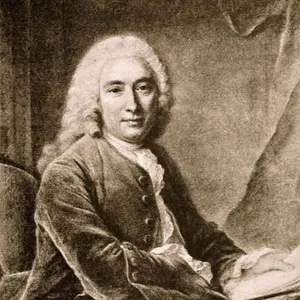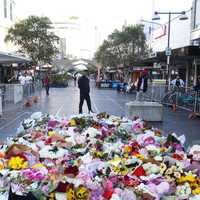
Before we answer that question we had better find out about who Rebel was. Jean-Fery Rebel was a French baroque composer who lived from 1666 to 1747 and wrote what could be considered avant garde music two hundred years before it is generally agreed to have started.
Rebel is hardly a household name, for two and a half centuries he has been little more than a footnote in specialised music texts. However in the last few decades there has been a resurgence of interest in his music and he is now recognised as an innovative composer of the Baroque period.
To better place him in his time period he was a generation younger than Jean-Baptiste Lully (who taught him violin) a few decades older than Jean-Phillipe Rameau and a near contemporary of Francois Couperin.
Like Couperin he belonged to a musical dynasty. His father Jean Rebel was a tenor in the French Royal Chapel, his uncle Robert was on the court music staff and his sister Anne-Renee became a noted singer. Jean-Fery’s oldest son Francois gained fame as a violinist, theorbo player, conductor, composer and opera director. Jean-Fery though, was the most famous Rebel.
He composed music during the reigns of two kings Louis XIV and Louis XV, performed with his son at the Chapelle Royale and composed one opera, Ulysse – which received half a dozen performances in 1703 and was forgotten about until 2007. He also became the leader of the elite Versailles orchestra – 24 Violons Du Roy.
His most significant compositions were in the world of ballet. Not quite the ballet that we are familiar with but staged courtly dances that were independent scenes in operas. Amongst these were also choreographed symphonies, the most notable of them was Les Elemens written in 1737.
The world view during Rebels’ lifetime included the notion of the Universe consisting of four elements – earth, air, fire, water. The conviction goes all the way back to the Ancient Greeks, who also included a fifth element – ether but that was excluded by Empedocles and subsequent philosophers such as Plato and Aristotle retained only the original four elements.
Another Ancient Greek concept that was passed down through the ages was that a state of chaos preceded the creation of the Universe. The Ancient Greek poet Hesiod wrote in his Theogony – “ Verily at the first Chaos came to be, but next wide-bosomed Earth, the ever sure foundations of all.”
This is where Rebel steps into the story with his composition – Le Chaos. Rebel attached it as an introduction to his “simphonie” Les Elemens. In the 18th century when the biblical story of Creation was believed by most people, it was understood that God created the world, not from nothing but chaos – which consisted of the four elements in contention with each other.
As Rebel wrote of the work: “The introduction to this Symphony was natural; it was Chaos itself, this confusion which reigned between the Elements before the instant when, subject to invariable laws, they took their prescribed place in the order of nature, I dared to combine the confusion of the Elements with harmonic confusion. I tried to make heard all the sounds mingled together, or rather all the notes of the octave together in one chord.” By that he means that the opening chord was every note of the D minor scale (D-E-F G-A-B-flat-C-sharp) played simultaneously. It’s likely that it’s the first notated tone cluster in the history of music and is reminiscent of passages of Stravinsky’s Rite of Spring that came 176 years later.
Let’s hear it for ourselves:
It’s an astonishing and jarringly original piece of music but it is the work of a 71 year old composer whose previous compositions had been admired for their “taste and tenderness” and their forbearance of the “frightening and monstrous.” It would be tempting to say that he rebelled from the musical conventions of the time to write such a dissonant piece of music and it’s certainly true that it wouldn’t be out of place in a 20th century avant garde music program. But to suggest that Rebel was taking music in a new musical direction is incorrect. Rebel would have thought the idea absurd, he was simply depicting chaos. If someone suggested to Rebel that in two hundred years people would write music that sounded like it he most assuredly would have laughed at the idea.
Sixty years later, Haydn wrote his masterpiece The Creation with a depiction of chaos that seems quite orderly in comparison to Rebel.
Les Elemens is worth listening to in its entirety, it’s an incredible piece of music that stands as a work of insight and innovation.
Share "Was Rebel a Rebel?"
Copy
















